Reviewing neurodivergent characters in media. Feel free to submit your reviews of representation in media to us. Mod applications are currently closed. Icon from flickr
Don't wanna be here? Send us removal request.
Text
PSA to authors writing dyslexic characters (and just people in general) that most dyslexic people don’t experience letters “jumping” or moving around on the page.
I myself am NOT dyslexic, but my mom and brother are, and I work full-time with dyslexic children. The research on literacy and dyslexia is constantly changing, but nothing I have learned supports letters floating, moving, or jumping, nor have any of my students reported experiencing something like that. It is a part of some other disorders and may occur for some dyslexic people, but it is not the most common presentation.
What I do see very often in my students: b/d/p/q reversals (eg reading “pig” as “big”,) guessing words based on the initial letters (eg reading “spot” as “spin,”) and changing vowel sounds (eg, reading “bet” as “beet.”)
In terms of writing, I often see letter reversals outside of b/d - for example, students writing g or s backwards. I also see spelling errors that come from difficulty distinguishing similar sounds in words. An example of this would be a child spelling “train” as “chrain” or “clod” as “cod.”
I work with K-5th grade, where we spend most of our time working with one-syllable, short vowel words, but of course multisyllabic words with complex vowels (like “treatise” or “diorama”) will be even more difficult for dyslexic people and may be a struggle for dyslexic adults.
112 notes
·
View notes
Text
something that's been bothering me is that there's a presentation of autism that might be considered "classical" or "stereotypical" and it's what's mostly used in mainstream media as an autism representative, but often is implicitly mocked by the allistic characters and audience. so many autistic creators write off that presentation of autism as merely a harmful stereotype or caricature and never include it in autistic led media, and actively push back against other people who do. so we never get to see ourselves as anything other than the butt of the joke
309 notes
·
View notes
Text
Writing a Schizophrenic Character: Everything But Hallucinations
Plain text: Writing a Schizophrenic character: Everything But Hallucinations
Hey! Mod Bert here.
So: you’ve decided to write a character with schizophrenia or schizoaffective disorder (there are other disorders on the schizophrenia spectrum but I will be focusing on these for today)
You’ve done it, you have their hallucinations and maybe even delusions picked out. Maybe they are one of many who experience auditory hallucinations or maybe they also have visual hallucinations or a combination. Maybe they have olfactory hallucinations as well. They may have persecutory delusions or delusions of reference or something like Cotard’s delusion or clinical lycanthropy. Awesome, you’ve done it!
What, I hear you say? What do you mean that’s only 2 of the 5 components needed to be diagnosed with schizophrenia? What do you mean, you don’t need to hallucinate at all to be schizophrenic?
What Goes Into a Diagnosis of Schizophrenia
Plain Text: What goes into a diagnosis of schizophrenia
Not a lot of people realize there’s more to schizophrenia and schizoaffective than just hallucinations or delusions. There are 5 diagnostic criterias that are needed for schizophrenia, and only 2 of the 5 are needed for a month, with larger symptoms happening for six months or more. Let’s get into it.
Delusions
Hallucinations
Disorganized speech or thinking*
Disorganized or unusual motor behavior (catatonia)*
Negative symptoms (avolition, anhedonia, flat affect)*
I’m going to focus on disorganized speech/thinking, catatonia, and negative symptoms.
Disorganized Speech/Thinking
Plain Text: Disorganized Speech/Thinking
Schizophrenia and related disorders are often called “thought disorders” for a reason. Speech and thinking can be extremely affected, and for people like me this can be one of the first and most striking examples of an episode coming. Some people will always have disorganized symptoms that will flare during episodes. A myth is that schizophrenia can be indistinguishable with medicine: most people will have some level of symptoms even during moments of peace or “remission”. More on remission later.
So, disorganized speech. Some examples are: word salad (schizoaphasia), thought blocking, poverty of speech (alogia), pressurized speech, clanging, and echolalia.
Word salad: a combination of words that do not make sense together. Often called schizoaphasia for its similarity to jargon in Wernicke’s aphasia, this is instead a disconnection with the brain and not due to damage to the language part of the brain.
(Example: the salad would be yellow in the fat cow).
Thought blocking: A severe loss of thought, often paired with connecting two trains of thought that are not connected
(Example: I went to the………Do you like grapes?)
Poverty of speech: A lack of organic responses to speech or organically speaking, it can be severe enough that a person only responds to questions or in one word responses. Can also happen in severe depression.
(Example: Person A: Did you do anything fun today?
Person B: Yes.
Person A: Oh, what did you do?
Person B: Store
Person A: How was it?
Person B: Fun)
Pressurized speech: A sort of frenzied way of speaking associated with psychosis or mania.
Clanging: Connecting phrases together because of what they sound like instead of meaning
(Example: I went bent tent rent).
Echolalia: Repeating word’s and phrases. Commonly also associated with Autism Spectrum Disorder.
(Example: Person A: I went to the store.
Person B: To the store.)
These are not the only examples but they are some ones I thought I'd highlight, either because they’re well known or I have experience with them, or because they’re famously thought of with other disorders as well and I wanted to point out how things overlap.
Personal experience: I had severe alogia for the duration of my last and worst episode. People thought I was mad at them because of the clipped way I spoke and the lack of really speaking. It got me in a lot of trouble. I didn’t realize what I was saying was different or weird (I have the least insight when it comes to my speaking patterns affected by my schizoaffective, meaning I can’t hear any difference and all of this is from repeated conversations with my mom, who was my caretaker for a bit and knows the most about my speech and what it means). The best solution was talking with people and being honest and educating myself and others. I don’t know about others, but I couldn’t have used AAC at that time.
Catatonia
Plain text: Catatonia
Fun fact: catatonia means unusual motor behaviors! Any unusual motor behaviors mean catatonia. This includes what we think of when we think of catatonia in schizophrenia (inability to move) as well as the opposite (being unable to stop moving) as well as strange movements and ways of holding and moving the body! Catatonia in the DSM-5 includes 3 or more of these 12 behaviors:
-Agitation unrelated to external stimuli
-Catalepsy
-Echolalia
-Echopraxia
-Grimacing
-Mannerism
-Mutism
-Negativism
-Posturing
-Stereotypy
-Stupor
-waxy flexibility
I have some experiences with catatonia-like symptoms but since they were never identified as such I’ll skip those for now. I will say that catatonia is a symptom that can happen in many disorders besides schizophrenia as well.
Negative Symptoms! Yay!
Plain text: negative symptoms! Yay!
So a positive symptom (Hallucinations or delusions) are symptoms that add something to reality or a person. Negative symptoms are symptoms that take away. There are 5 A’s:
-Alogia (Again, poverty of speech, our favorite)
-Avolition (Lack of energy and motivation)
-Affect (Blunted affect, or a flat way of speaking)
-Anhedonia (Lack of pleasure in things that used to bring you pleasure, often thought of with depression)
-Asociality (Lack of interest in social events and relationships)
There are also often cognitive changes including thinking and memory, information recall, understanding, and acquisition, and so forth.
Schizophrenia and schizoaffective often (but not always) happen with what’s called a prodromal period. This period can be months to years (mine was a little less than a year) and mainly consists of negative symptoms. Slowly, positive symptoms are added. There are thought to be stages to schizophrenia including prodrome, active phases, and remission.
I’ll talk about that a little for a second because I’m currently in remission and no one knows what that means. I was diagnosed with schizoaffective depressive type in January 2021. As of February 2024, I no longer qualified to be rediagnosed because my symptoms were strongly under control and no longer severe enough to qualify for a diagnosis. They also didn’t distress me or impact my daily life severely. Day to day now I still have mild symptoms and take my antipsychotics (trying to go off them have made it clear that I still have some symptoms I choose to keep medicating) but I haven’t had a delusion in 2 years and been hospitalized in 3. There’s always a possibility of another episode but I work with my team to keep myself one step ahead if that happens.
What I want from a character with schizophrenia
Plain Text: What I want from a character with schizophrenia
Alright the writing advice part. What do I want from a character with schizophrenia or schizoaffective (which is schizophrenia plus either depression or bipolar).
-Characters with caregivers.
-Characters using coping strategies (recording hallucinations to tell if theyre hallucinations, taking medication, having service animals that greet people so they know if they’re a hallucination, using aids for the cognitive symptoms like sticky notes and organizational tools)
-Characters who know other characters with their disorder, either online or in support group or through running in similar circles
-Characters having autonomy
-Characters who aren’t the killer or horror victim. I know it’s cool to have the schizophrenic protagonist in horror, and I love horror, but I don’t want to read about the horror being symptoms the whole time
-Characters who are in magical scenarios, who are in fantasy and sci-fi. The schizophrenic princess and the schizoaffective robot technician aboard the spaceship.
-Medication and hospitalization treated casually. Sometimes we need higher care. That’s morally neutral
-Characters with negative symptoms and speech symptoms.
-Characters with catatonia!
-Characters with other disorders as well
-characters with side effects from medicine treated casually
-Characters with cognitive symptoms
Thank you for reading this incredibly long thing! Happy writing!
3K notes
·
View notes
Note
I have a character with paranoid schizophrenia who starts the story not being medicated and doesn't really want to be so far.
She has frequent auditory hallucinations since childhood, but she likes them and has friendly bond with them.
I've done a lot of research on how different people lead with their auditory hallucinations, and chose to take this approach because they're usually always portrayed negatively in media when that is not the case for everyone who experiences psychosis.
What I'm wondering is if it would be alright for her to want to seek treatment later on. In the world she's currently in (fantasy setting), there's no way she can consult with a health care professional nor get actual medication, but she can seek healing magic which would have a similar effect to antipsychotics.
I wanted to know if it is alright for me, as someone who is not on the schizospectrum, to portray her symptoms getting worse and more overwhelming over time and have her make the decision to seek help.
Being neurodivergent, I know how wrong people can get the relationships we have with our conditions, and I also know not everyone would like to see certain struggles be shown in media. However, I would like to show both the good parts of her condition (how important the voices are to her) as well as the less good parts, always as carefully and respectfully as possible, of course.
Thank you already for your time and for this amazing blog! It has been very useful to me.
Hello there, friend!
There are obviously a lot of ways to experience relationships with auditory hallucinations or any symptom of psychosis and schizophrenia specifically. I have friends with psychosis and with schizophrenia or schizoaffective specifically who have decided against taking medication - there are also people with these disorders who have decided against medication but been given medication anyways.
It is also possible for someone to have symptoms for a while that get worse - for schizophrenia and schizoaffective specifically there is usually a period called prodrome or the prodromal phase where certain negative symptoms (symptoms that take away such as lack of affect or lack of energy, difficulty with hygeine, and so forth) become more pronounced and light psychotic symptoms develop until they become more severe in the "active" phase of the disorder.
as for having symptoms as a child that get severe in late teenage years or young adulthood...it is possible. There are multiple people I know, including myself, who had psychotic experiences as a younger child that later turned from magical thinking and odd experiences to active psychosis later. But I do want to stress that childhood schizophrenia is much more rare than it is often represented in media, and often more severe than how it shows up as an adult. Your character would likely have psychotic experiences but not full-blown active psychosis or schizophrenia until later. I also want to add that sometimes children have experiences that may seem odd and that is not always disordered, even in a character with a thought disorder!
However, with that in mind - having symptoms get from comforting to disturbing enough to seek help is absolutely a narrative that happens, and I think it's a great one to include in the character.
One last small thing - paranoid schizophrenia may or may not be used depending on where in the world the story takes place or when the story takes place. The DSM-5 no longer puts schizophrenia into subtypes but the ICD still does! Something to think about.
-Mod Bert
#paranoid schizophrenic#schizophrenia#schizophrenia representation#schizophrenic characters#writing advice
61 notes
·
View notes
Text
Okay, so, a thing that might be helpful for people to remember: “autism is a spectrum” means that just because you don’t experience autism a certain way doesn’t mean that other people don’t experience it that way.
I’ve fallen into this trap myself sometimes, but yeah, I have seen people tarring things as “inaccurate stereotypes” that are… like… actual autistic traits?
“Autistic people aren’t monotone or awkward with their speech because I’m not! It’s a harmful stereotype!”
Idk, when that’s said in response to dozens of autistic people saying that they sometimes struggle with tone of voice or awkward/formal phrasing… Well, it’s frustrating.
Like, I don’t stim much. I certainly don’t do it in ways that people around me view as obvious.
But I’m not out here saying “anyone who says that autistic people flap their hands is perpetuating a harmful stereotype!”
But yeah, maybe take a moment to consider if the thing you’re railing against is actually inaccurate, or if it just doesn’t apply to you.
2K notes
·
View notes
Note
Do you maybe know why so many people react so negatively to neurodivergent headcanons of characters in popular media? I’ve been scratching my head over this looking for a satisfying answer.
While this blog is for canon representation - to answer your question: for the most part, I think it's just ableism. Some people don't like to imagine a character they like being neurodivergent, unfortunately.
-Mod Violet
40 notes
·
View notes
Note
Hello, I'm writing a character that is autistic. I'm autistic and white (afab) and my character is black (amab), can I use my own experience with autism as a "draftc for his character? If not, what can I do to make the writing feel correct/original?
(sry if I made any grammar mistakes, I'm not a native speaker)
Hi asker,
Ultimately, autism is both race- and sex- and gender- neutral. Symptoms and traits are not going to vary drastically because of any of the above things.
So yes, you can use your own experience as a basis for your character. What you'd need to pay more attention to is the responses of other people to your character and the culture that they're being raised in.
For example, black disabled people are treated especially heinously by law enforcement, so if you were going to include anything about that, a little black kid might be taught as much as possible by his family to be careful around cops and develop a script and to not stim around them. Masking and not stimming in a case like this isn't a case of hiding your true self, it's about protecting your life and safety. And yet, this doesn't actually have anything to do with this character's autism being any different than a little white boy his age. Just that it is treated differently.
And, like any character of color, the only way to make them isn't just to make them live the same life culturally than a white person and then change the color of their skin. Researching about their culture and including bits of that in their life is important – things like food, values, hairstyles, cultural events, holidays, and such.
I want to add that the assigned genders of your characters don't matter as much as you think they might. I know it's common to refer to 'female/girl autism' on the internet as its own separate beast, but there isn't really a material difference in symptoms and traits. Some traits will be seen differently socially by others, like with race, and people might be treated differently depending on their sex about how they behave, but the behaviors themselves are not divided nicely on a gender line or anything like that. That misconception, really, is just born from misogyny, sexism, and societal expectations, not from autism itself being different.
Hope this helps,
mod sparrow
Hi,
mod Sparrow covered the actual question, so I'll mention the AGAB part.
There is no sexual dimorphism related to hormones, genitals, or chromosomes in autism. The severity of a person's symptoms or how they experience them is unrelated to any kind of sex characteristic, nor to a past decision made on the basis of at-the-time appearance of the person's external genitals, which is what AGAB is.
The "girl/boy autism" is a sexist dichotomy that is completely made up and presents girls as inherently less disabled by their autism. It erases the severely disabled girls and women who do have autism and shows "girl autism" as more manageable and pro-social than "boy autism" which is impossible to control and anti-social. That's nonsense and the same kind of erasure of women as in every other minority.
The only real difference that is based on gender is how it's socially treated by others, just like mod Sparrow mentioned. Men's autistic symptoms are generally considered more acceptable than they would be if they belonged to a woman, even if the symptom is exactly the same. If a man shows autistic tendencies, he can be considered "intriguing and unique", but if a woman did the same, she would be "off-putting and weird".
This, however, obviously isn't based on what the person's AGAB was. A transgender woman's autistic behavior won't be seen the same way a cisgender man's behavior would be. It will in fact put her under more scrutiny than a cis woman would be under, not less. AGAB is a past event that serves no function in this question, nor in most contexts. AGAB doesn't answer for gender, presentation, chromosomes, hormone dominance, organs, functionality of these organs, or anything else other than what someone arbitrarily said about a newborn. Categorizing people based on what gender they were assigned at birth - rather than any present characteristic - is bioessentialism.
I know this is not an answer to the ask, but please question what a past evaluation of the character's genitals would inform here that their actual gender wouldn't.
mod Sasza
57 notes
·
View notes
Text
"Hell Followed With Us tells the story of Benji, a trans teen who escapes a fundamentalist cult that causes an apocalyptic event destroying much of the world’s population...
The novel features not only a transmasculine protagonist but autistic representation, as well, in the character of Nick, the leader of the teens' found family who is “gorgeous, autistic, and a deadly shot," according to the book's publisher."
#hell followed with us#mod violet here: haven't read the book so I can't comment on how good the autistic rep is#autistic representation#autistic characters
40 notes
·
View notes
Note
Hi! I'm currently working on writing a book about a character with schizophrenia, but I'm afraid to fall into some sort of "crazy-guy" stereotype.
He starts developing a romance with a close friend of his, but I don't want it to be a "I can fix him" type of deal.
I'm a med student and have researched about it, but I'm afraid that having this knowledge and actually knowing what people with this go through is entirely different.
It's a bit complicated to explain, but the book is between a triller and a slight slice of life.
Howdy!
There is nothing wrong with a person with schizophrenia or any level of psychosis, or even any person with severe mental illness and neurodivergence being in a relationship, even if they are still in recovery or somewhat unstable. That doesn't push into "i can fix him" unless the relationship was initiated because the person wanted to affect their partners health and is doing so by being in a relationship, which is very different. People with any level of disability or disorder can have relationships.
To answer more I'm going to need some more information about how the tropes are being handled.
I also want to add that very few characters with psychosis are given meaningful romantic relationships and that giving a character a relationship where the drama is not focused on the character's schizophrenia or how it impacts their lover would be an amazing thing to see. People with schizophrenia and psychosis in general are often, when portrayed as in relationships, shown as being controlling or abusive and while anyone can be abusive it is more likely for a character in active psychosis to be gaslit or controlled by their partner simply because of how difficult it can be to discern reality at times.
I also want to say be careful about the idea of a main character with schizophrenia being in a thriller. It is absolutely possible to have a character with serious mental illness to be in a thriller or horror story, and as someone with psychosis who loves horror that's not my concern. But there is an overabundance of psychotic characters in thrillers acting as the antagonist, or as villainous, and the plot twist of "the violence was in his head the whole time" is overdone as representation and not as exciting as a psychotic character getting to exist in the story as a fully-fledged protagonist or character.
-Mod Bert
50 notes
·
View notes
Text
if you ever watched house the medical drama TV show, know that dr house mean and rude to everyone and very insensitive.
season 3 episode 4 about a severely autistic nonverbal boy with behavioral issues and no way to functionally communicate
of course have bad aspects. filmed in 2006. have bad ABA elements and bad PECS and drills and doctors not knowing how to handle nonverbal autistic boy w behavioral issues. definitely not down playing that. (and some other bad things in the subplot not related to the boy)
but dr house out of all people. is one that actually figured out how to communicate with him.
in this post i talk about how house’s interaction w the boy demonstrates how to connect with nonverbal nonspeaking autistics (despite the “he won’t understand”), presuming competence, the nuance of autism parents, and functional communication. i use the show to go beyond the plot and talk about wider (level 1 speaking) autism community issues.
so even if you not interested in the TV show House. still hope you can read.
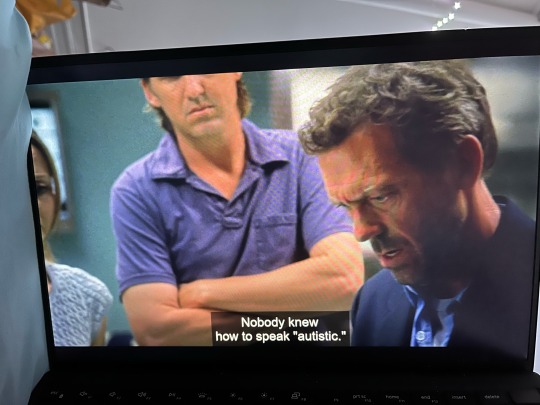
“nobody knew how to speak ‘autistic.’ “
procedure need anesthesia mask thingie. and kid screaming and no one can put mask on him and make him stay, everyone trying to hold him down. house came in made insensitive remarks as always, but modeled to kid what to do. house put the anesthesia mask on him and breathed for bit for kid to see until he stopped screaming, then put it on kid, then put on himself, then on kid who successfully went under anesthesia.
which was so important. meant so much to me. because kid so unfamiliar don’t know what people are doing to him, probably no one explain, may or may not understand what happening. everyone so impatient and don’t know how to get on his level, and so many people restrain him so of course want fight back. but house was only one who considered what the kid needs what he is feeling. house mirrored it showed him what will happen what to do to kid in a way he will understand. he was even gentle. he smiled a little.
yes house used rude monkey metaphor to explain reasoning. but does that to every patient nonverbal autistic or not. so really, for house he didn’t treat the patient any differently.
afterwards. house even critiques dr cameron’s construction of “normal” in a somewhat intersectional, race conscious way. and don’t pity the child at all. resisting the idea of institutionalization.
See, skinny, socially-privileged white people get to draw this neat little circle. Everyone inside the circle is normal. Everyone outside the circle should be beaten, broken and reset, so they can be brought into the circle. Failing that, they should be institutionalized, or worse, pitied.
So, it's wrong to feel sorry for this little boy? Why would you feel sorry for someone who gets to opt out of the inane courteous formalities, which are utterly meaningless, insincere, and therefore, degrading? This kid doesn't have to pretend to be interested in your back pain, or your excretions, or your grandma's itchy place. Can you imagine how liberating it would be to live a life free of all the mind-numbing social niceties? I don't pity this kid.
I envy him.
when the medical team was suspecting that parents slip kid alcohol to calm him down (which turned out to not true), house breaks down why martyr parents becomes martyr parents:
How would you know that? The kid can't talk. Why do you think I took this case? He's not going to give away the ending. They quit their jobs for him. Yes, they are everything you'd want in a parent. Unfortunately, their kid is nothing you'd want. When a baby is born, it's perfect. Little fingers, little toes, plump, perfect, pink, and brimming with unbridled potential. Then it's downhill. Some hills steeper than others. Parents get off on their kids' accomplishments. ...They'll annoy you with trophy rooms and report cards. Hell, they'll even show you a purple cow and tell what a keen eye for color their kid has. But this kid, he doesn't smile, he doesn't hug them, he doesn't laugh. His parents get nothing but the right to brag that their kid picked orange juice out of a lineup. So you figure they slip the kid a mickey so they don't have to deal.
i think show parents in dynamic way too. lots of ableism, for sure. the bad coercive compliance drill kind of ABA tactics, for example.
but fully shows how hard it is to raise a “severely” nonverbal autistic kid with behavioral issues and no functional communication. as much as autistic community like to deny it, it is hard. it is a lot of work. and recognizing and acknowledging that it is a lot of work whether because of inherent autism as a disorder or because lack of societal support, acknowledging this fact alone doesn’t make a parent a martyr parent, an autism parent. i think this is where the (level 1 speaking late diagnosed) autistic community get wrong.
the parents are desperate. they do bad things. they don’t mean to do harm to the kid, they think they’re doing what’s right for their kid. but they still do bad things. and they care for the kid, they celebrate the kid’s achievements, yes sometimes misguided but they want to do good. there is nuance to this. the parents aren’t vile. they aren’t evil evil ableist want to force their kid to be neurotypical against all odds regardless of well-being. most autism parents are more nuanced like this. the level 1 speaking autism community need to listen, too.
and the show ended with. as the family is leaving, the autistic boy voluntarily goes towards dr house. and hands him his video game console (like a switch but not a switch idk), something that is a part of his routine that he melts down when interrupted when grabbed, that he probably very attached to. he gave it to house. and looked at house for a long time.
yes, the eye contact part can be seen as the show over valuing eye contact. but. the bigger impact is the fact that. the show showed the boy connected with house. whether it is thanking him, feel safe with him, we don’t know because the boy have no functional communication. but the boy formed connection with house, and expressed the connection in his own nonverbal way. no “thank you,” no hugs, no conventional way, but the boy’s communication in his own unique nonverbal autistic way. looking at his parents’ reactions, this is incredibly rare, probably even first time, and the parents are crying.
and house was able to diagnose the kid because he actually listened to all forms of communication. he didn’t dismiss the kid’s repeated drawings as meaningless. he didn’t dismiss the PECS image the kid picked in response to his question as meaningless and incompetent even though it was not the image/answer he was initially suspecting. and both things were crucial to the correct diagnosis. if house didn’t listen to them, the kid would have died. house listened to all forms of communication. he assumed competence. he assumed the kid was trying to communicate something, he didn’t chalk the kid’s behaviors as meaningless. despite the “he won’t understand you” “it would work” etc throughout the episode.
but. also want to say. these forms of communication, albeit need to be listened to, is still not functional communication. and functional communication is important and should strive towards for a reason.
another thing the (level 1 speaking) autistic community get wrong is saying nonverbal nonspeaking autistics can communicate same way/as effectively as speaking autistics. that only person to blame is evil evil ableist people not listening to their behaviors. if only they listen!
but more nuanced than that. many many ways to decipher the kid’s repeated drawing, for example. house got it right. he assumed that drawing has connection to the kid’s medical symptoms, and that it is a worm parasite. there can be million other interpretation even if you take kid seriously. i thought it was a ocean wave, for example. thought the kid like waves like beaches like ocean.
if the kid had functional communication—and by functional communication, i don’t mean speech, altho that can be a form of it, i include robust AAC—he could have communicated. in words (spoken/typed/written). what he was experiencing. what he was seeing in his eyes, the swiggly worms he was seeing. and the diagnosis would have arrived sinner. been put through less danger. and if house wasn’t there and another another was there and the doctor didn’t pay attention to the kid and dismissed the kid, the kid would have died because he didn’t have functional communication to tell people what he was experiencing.
it’s not as easy as “just listen!!” and chalking everyone who don’t exactly understand the nonspeaker as ableist.
#house#house md#autistic representation#autistic characters#non verbal autism#nonverbal representation#ableism
2K notes
·
View notes
Note
Do you maybe know why so many people react so negatively to neurodivergent headcanons of characters in popular media? I’ve been scratching my head over this looking for a satisfying answer.
While this blog is for canon representation - to answer your question: for the most part, I think it's just ableism. Some people don't like to imagine a character they like being neurodivergent, unfortunately.
-Mod Violet
40 notes
·
View notes
Note
hey there! so i'm writing a character who is extremely skilled in combat, but is also autistic and dyspraxic (like myself), with traits that could make a lot of physically demanding tasks like fighting difficult. the story is set in an ambiguous time period that's very advanced in some ways and not so advanced in others, so do you guys have any ideas for ways i could give her a fighting style or some kind of aid that could accommodate her poor motor skills/coordination/balance, spatial unawareness, etc? thank you!
Hi!
There's a lot of ways to have dyspraxia, I will base my answer on my own experience with it (I have major issues with gait and trunk coordination, and a bit with my hands as well).
I would probably stray away from a lot of martial arts where you have to engage all four limbs at all times. Four is just too much to keep track of (I mean, I struggle with jumping jacks...), I would try to go for something that utilizes a greater distance and doesn't require as much moving around all the time. If her hands have enough control, maybe she could go with bow and arrow or something similar (crossbow, gun, or some other fantasy shooting device)?
For closer distance fighting that doesn't need as much hand control, you could always go the Very Big Sword route - doesn't require much precision because it's Big, good spatial awareness not needed because it's so Long it will probably hit anyway, and you might as well stand while using it rather than doing overcomplicated maneuvers.
I hope that these give you some potential ideas in what direction to go! :-)
I'd love a story about a dyspraxic character doing all that cool stuff! Good luck with your story:)
mod Sasza
#actuallyautistic#autistic representation#dyspraxia#dyspraxic representation#writing neurodivergent characters
154 notes
·
View notes
Text
Why does every story that has a character with Down’s syndrome reduce them to “oh this character has Down’s syndrome, isn’t that sad?” Fuck that! Can I have a gay romcom where someone with Down’s syndrome falls in love with their co-worker? How about a slice of life webcomic where a girl with Down’s syndrome and her buddies start a band? Or a supernatural story about a vampire hunter with Down’s syndrome. I don’t know there’s so much potential you could do but you just make it a sad thing!
809 notes
·
View notes
Note
I have a character with Tourette’s Syndrome that is an engineer. His tics are pretty active on a daily basis, both motor and vocal. I know tics can calm down when a person is focused. My character works really well under pressure, and when he is working with his hands his tics calm down. Is it plausible that this character can safely disarm bombs?
Hello!
It is true that tics can calm down when somebody is focused, even to the point where they disappear completely. I find that this happens most to me when I'm working with my hands but focus in general can calm them.
That said, things like stress and excitement can also make tics worse. You've mentioned that your character thrives under pressure so defusing bombs would have a better shot at calming their tics instead of making them worse.
Something to note is that there are actually people with Tourette's in our world that disarm bombs for a living so it could certainly be a possibility for your character! This article [Link] talks about an explosives ordnance disposal (EOD) officer with Tourette's while this article [Link] goes more into his life.
This is somewhat unrelated but still worth mentioning but there are also surgeons with Tourette's! This Canadian surgeon [Link] has Tourette's. This article [Link] also talks about the same surgeon. Please note that it uses some language and phrasing that I disagree with but it does have some good information on how he deals with his tics while operating that may be helpful for your character!
Cheers,
~ Mod Icarus
Note: Edited to fix a broken link.
108 notes
·
View notes
Text
Stop Making Psychosis A Villainous Trait Challenge
64K notes
·
View notes
Note
I'm writing a story set in the 1800s that has an intellectually disabled character. how would you recommend I get across that they are intellectually disabled given that the respectful terms wouldn't really have existed then?
Hi!
I think that the best idea would be to just show the symptoms of their disability. Show them struggle with tasks (which ones would depend on the severity of their disability), if they are able to do so they could speak differently when compared to other characters - I often forget words when speaking, repeat myself because I didn't understand the answer to a question (or realized that it was the answer), or have to ask someone for a TLDR because I got lost in what they were saying (even if I'm actively paying attention). Sometimes I also have to circle multiple times to a single idea to "get it out" properly because it's hard to conceptualize it all at once. Your character could also get overwhelmed or stressed more easily.
Also, often ID comes with physical symptoms so they could have dyspraxia like me! In case their ID is caused by a syndrome, it could work to describe the facial features that come with it, e.g. I think most readers would be familiar with how a person with Down Syndrome looks like. But the most important part is to show the actual symptoms of the disability!
If you want to name the disability without using slurs, "delayed" or "mentally disabled" or "having a slower thought process" could also work. They wouldn't be my primary choices in most contexts, but for historical fiction it's a bit different. "Handicapped" also started being used in the late 19th century, it's not necessarily a slur but it's still offensive. You could go for something like "fallen behind their peers" if you want.
I think that it would be a good idea to mention in some kind of author's note that your work is a piece of historical fiction and that those terms aren't preferred now (and show those that are, i.e. intellectual disability in most places and general learning disability in the UK). A lot of people don't know this, so it could be genuinely educational!
Thanks for your ask, I hope this helps!
mod Sasza
88 notes
·
View notes
Text


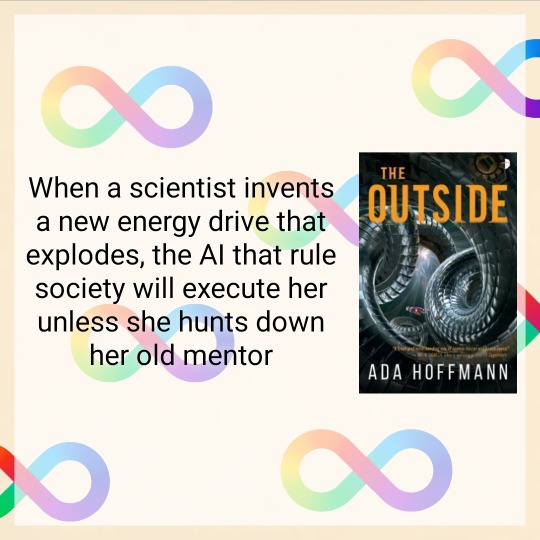
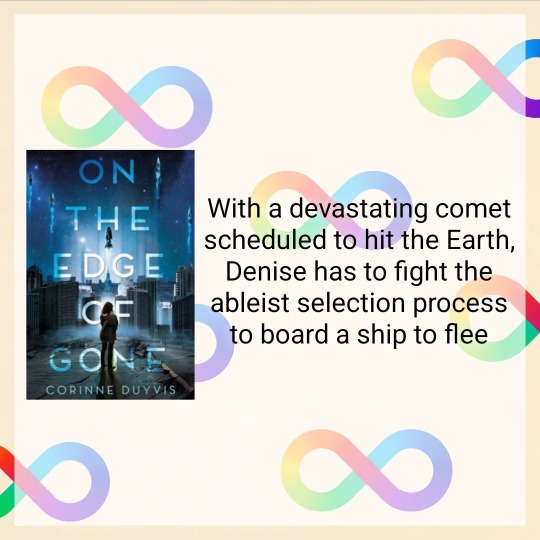

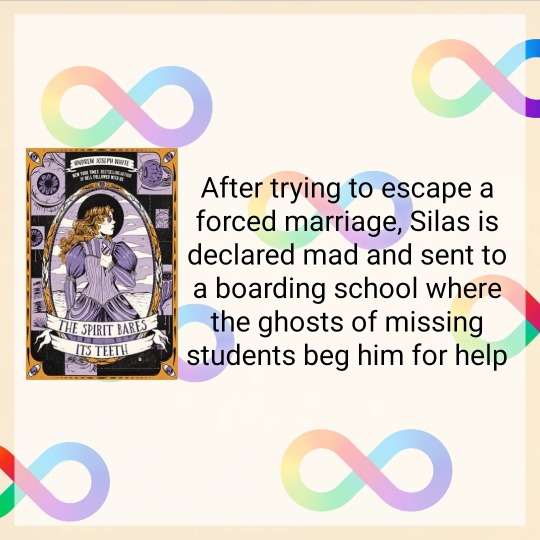
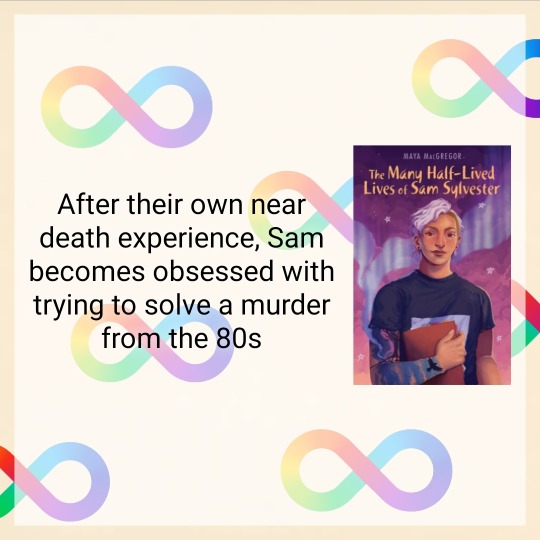
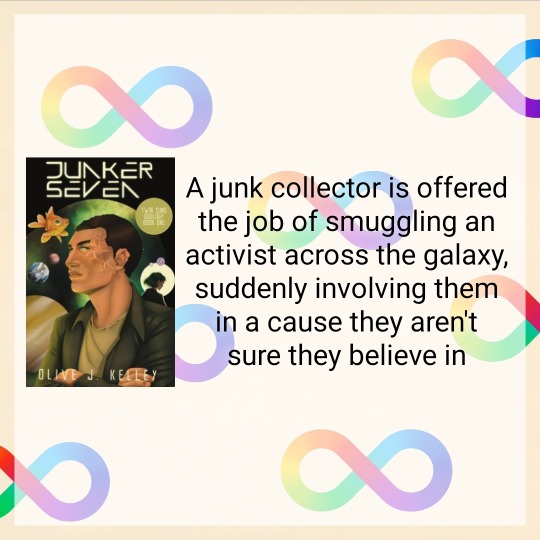
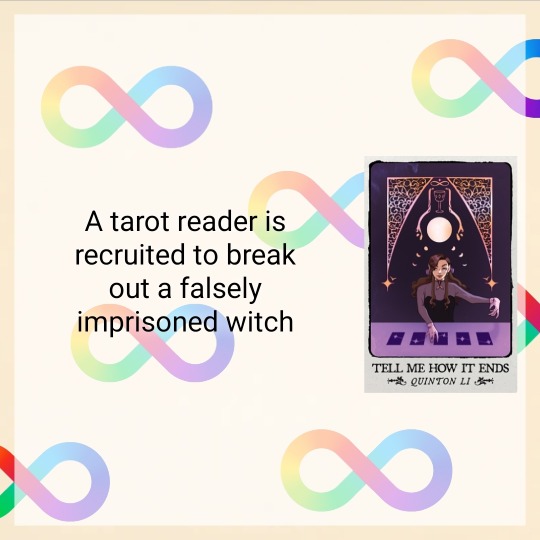
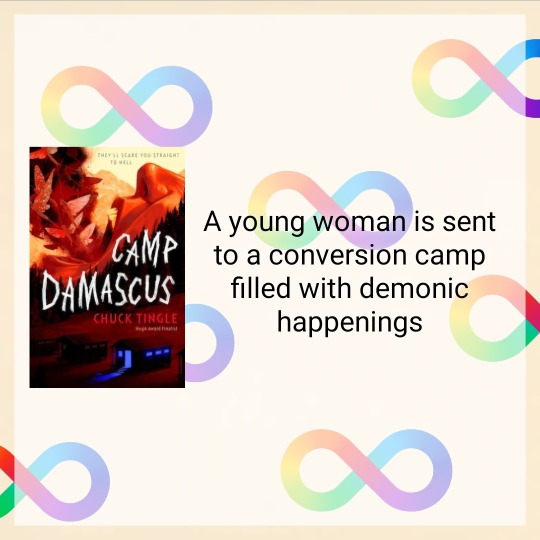
Another crosspost from my Instagram! Happy Autism Acceptance Month! Full titles under the cut
Their Troublesome Crush by Xan West
The Outside by Ada Hoffman
On the Edge of Gone by Corrine Duyvis
This Other World by AC Buchanan
The Spirit Bares its Teeth by Andrew Joseph White
The Many Half-Lived Lives of Sam Sylvester by Maya MacGregor
Junker Seven by Olive J Kelley
Tell Me How it Ends by Quinton Li
Camp Damascus by Chuck Tingle
52 notes
·
View notes